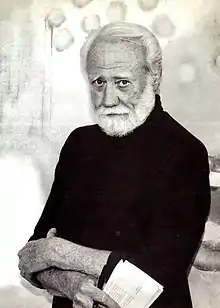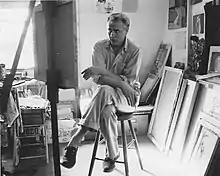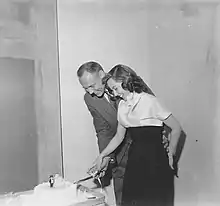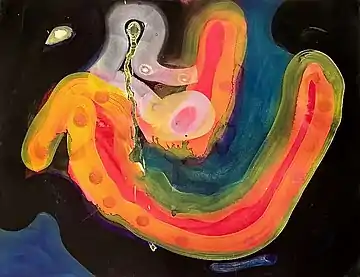
William Scharf (February 22, 1927, Media, Pennsylvania – January 15, 2018, New York City, New York)[1] was an American abstract artist from New York City.
Early life
Scharf grew up on Ridge Road in Media, Pennsylvania, the eldest of two children of Lester William Scharf and Ebba Scharf, née Anderson, of German and Swedish descent.
At age ten he was befriended by the illustrator N. C. Wyeth, who encouraged him, gave him art supplies, and later recommended him to the Pennsylvania Academy of the Fine Arts, writing: "This boy has the stuff".[2] Scharf would remain in touch with Wyeth until his death in 1945.
Education

At the Pennsylvania Academy of the Fine Arts he studied under Franklin Watkins, Daniel Garber, and Walter Stuempfig,[2] as well as under Abraham Chanin at the Barnes Foundation in Merion, Pennsylvania.[2]
In 1948 he received the Cresson Traveling Scholarship from the Pennsylvania Academy of the Fine Arts, went to Paris and studied at the Académie de la Grande Chaumière.[2] During this time he also travelled to Italy, Belgium, and England, and in England became friends with Leslie Illingsworth of Punch magazine, to whom he sold drawings.[2]
Personal life
In 1947 Scharf married Diana Denny, with whom he had one son, William Denny Scharf. The couple divorced in 1951.
In 1952 Scharf moved to New York City,[3] where he became associated with the New York School of the Abstract Expressionist movement.[3] The following year he moved to a studio on West 53rd Street, adjacent to the Museum of Modern Art, where he secured employment as a museum guard. During this time he became friends with Dorothy Miller and Mark Rothko, as well as the photographer Jack Manning, the jazz musician Willie Dennis, and other artists frequenting the Cedar Tavern in Greenwich Village, including Julius Hatofsky, Franz Kline and Willem de Kooning.[2]

In 1956 Scharf married Sally Kravitch — an actress with the stage name of Sally Jessup — daughter of the Savannah, Georgia lawyer Aaron Kravitch, and sister of Phyllis Kravitch. Mark Rothko was best man and his wife Mel was matron of honor. The reception was held at the Rothkos' apartment.[2]
William and Sally had one son, Aaron Anderson Scharf, born in 1964.
Teaching
Scharf taught at the School of Visual Arts in New York, the San Francisco Art Institute, Stanford University, the Pratt Institute,[4] and The Art Students League of New York,[5] from which he retired in 2015.
"Bill was a gentleman, a person of unassuming wisdom," league instructor Bruce Dorfman said. "We exchanged art and friendship. He was a caring teacher and mentor to his students. Most importantly, William Scharf was a great and important artist, and he loved his wife Sally." Former board member Victoria Hibbs added: "Bill loved teaching and respected each student"s style... He guided you toward your best work. He was gentle and sweet, but had a subtle, very wicked sense of humor."[4]
Influences and style
Scharf worked with Mark Rothko, and was influenced by his color field paintings;[3] other influences include the surrealist painter Arshile Gorky and the artists Willem de Kooning, Jackson Pollock and Hans Hofmann.[6] Scharf's style draws on these influences to create compositions of organic and geometric shapes, that are immediately recognizable.
In 1964 Scharf assisted Rothko on preliminary studies for the Rothko Chapel in Houston.[3][2]

On the Hollis Taggart Gallery website his work is described as follows:
"Scharf combines virtuoso paint handling, vibrant color, and rich symbolic language in canvases that engage the viewer in a transcendent and emotional dialogue.
This dialogue is accomplished in part through recurring symbols, which allude to hidden, mysterious narratives.
Scharf plumbs the psychological wells of collective myths for symbolic content: the crown of thorns, the ladder, the fish, and the cross can be found throughout, functioning not, as one might expect, as religious symbols, but rather as a means through which to access a deeper, symbolic level of visual communication."[7]
Writing in Artforum in 2018, Christopher Rothko described Scharf as:
"A virtuoso with a brush and pen, Scharf created works striking for both their resplendent color and bold gestural elements. But he was also a profoundly scholarly painter, drawing omnivorously upon symbols and themes from across art history as well as literature and distilling them into studiously balanced wholes."[8]
A history of Scharf's exhibits include San Francisco Art Institute (1969), the Pepperdine University's Frederick R. Weisman Museum of Art (2001),[9] and Richard York Gallery in New York City (2004),[10] as well as a number of galleries, including the Anita Shapolsky Gallery, and Meredith Ward Fine Art Gallery.
He is currently represented by the Hollis Taggart Gallery[11] in New York City.[12][13]
Exhibitions and collections
Solo exhibitions
2020 William Scharf: Elemental Color, Works from the 50s and 60s, Hollis Taggart, New York, New York [online][14]
2018 Primordial Language: Small Works by William Scharf, Hollis Taggart Galleries, New York, New York[15]
2016 William Scharf: Imagining the Actual, Hollis Taggart Galleries, New York, New York[16]
2012 William Scharf: Gold Dust, Meredith Ward Fine Art, New York, New York[17]
2010 William Scharf: Within White, Meredith Ward Fine Art, New York, New York[18]
2009 William Scharf: Blue Is, Meredith Ward Fine Art, New York, New York[19]
2008 Mercury Gallery, Boston, Massachusetts[20]
2005 Meredith Ward Fine Art, New York, New York[21]
2004 William Scharf: Recent Paintings, Richard York Gallery, New York, New York[22]
2002 P.S.1/MOMA, Queens, New York[23]
2001 The Frederick R. Weisman Museum of Art, Malibu, California[24]
2000–2001 William Scharf: Paintings, 1984–2000, The Phillips Collection, Washington, D.C.[25]
1993 University of Michigan Museum of Art, Ann Arbor, Michigan
1993 Rutgers University, New Brunswick, New Jersey
1987 The Armstrong Gallery, New York, New York
1987 The Elizabeth Bartholet Gallery, New York, New York
1987 Manhattanville College, Purchase, New York, New York
1985 Saint Peter's Church, New York, New York
1984 Mississippi Museum of Art, Jackson, Mississippi
1982 Mississippi Museum of Art, Jackson, Mississippi
1978 High Museum, Atlanta, Georgia
1977 Lerner-Heller Gallery, New York, New York
1976 Neuberger Museum, Purchase, New York, New York[26]
1969 San Francisco Art Institute, California
1964 Griffin Gallery, New York, New York
1963 Zabriskie Gallery, Provincetown, Massachusetts
1962 The American Gallery, New York, New York
1962 David Herbert Gallery, New York, New York
1960 David Herbert Gallery, New York, New York
1950 Dubin Gallery, Philadelphia, Pennsylvania
Group exhibitions
2020 Hollis Taggart, New York, New York
2014 Freeman Art, New York, New York
2005 National Academy of Design, New York, New York
2005 Peter McPhee Fine Arts, Stone Harbor, New Jersey
2003 National Academy of Design, New York, New York
2002 Richard York Gallery, New York, New York
2000 Anita Shapolsky Gallery, New York, New York
2000 League Masters Now, Arts Student League, New York, New York
2000 The Twenty-Fourth Annual National Invitational Drawing Exhibition, Emporia State University, Kansas
1999 Artists/Mentors, Denise Bibro Gallery, New York, New York
1998 Colgate University, Hamilton, New York
1998 Germillion Gallery, Houston, Texas
1998 Self-Portraits, Art Students League, New York, New York
1996 Hot Art, Anita Shapolsky Gallery, New York, New York
1995–96 Phillips Collection, Washington, D.C.
1994 X Sightings, David Anderson Gallery, Buffalo, New York
1993 American Painterly Abstraction, Zimmerli Museum, Rutgers University, New Brunswick, New Jersey
1992 The Fifties, Part Two, Anita Shapolsky Gallery, New York
1991–92 National Museum of American Art (Smithsonian), Washington, D.C.
1991 Anita Shapolsky Gallery, New York, New York
1991 American Academy & Institute of Arts and Letters, New York, New York
1989 American Academy & Institute of Arts and Letters, New York, New York
1988 National Museum of American Art (Smithsonian), Washington, D.C.
1982 Solomon R. Guggenheim Museum, New York, New York
1980 Hirschl-Adler Gallery, New York, New York
1980 The Papier, Summit Art Center, Summit, New Jersey
1979 Smith-Anderson Gallery, Palo Alto, California
1978 E. P. Gurewitsch Gallery, New York, New York
1977 Summit Art Center, Summit, New Jersey
1976 Galerie Alexandra Monett, Brussels, Belgium
1976 Les Ateliers Du Grand Hornu Galerie D'Art, Brussels, Belgium
1974 San Francisco Art Institute, San Francisco, California
1973 New Images, Martha Jackson Gallery, New York, New York
1970 San Francisco Art Institute, San Francisco, California
1963 Rose Art Museum, Brandeis University, Waltham, Massachusetts
1963 American Gallery, New York, New York
1963 Aldrich Museum, Ridgefield, Connecticut
1963 The New Arts Gallery, Atlanta, Georgia
1962 American Gallery, New York, New York
1962 University of Illinois Annual, Urbana, Illinois
1962 The Vanderlip Gallery, Philadelphia, Pennsylvania
1959 Charleston Gallery of Art, Charleston, West Virginia
1959 The National Gallery, Dublin, Ireland
1959 Reynolda House, Winston-Salem, North Carolina
1958–59 New Talent, American Federation of Art (Travelling Exhibition)
1957 Avant Garde Gallery, New York, New York
1958 MOMA, New York (European Travelling Exhibitions)
1958 The Institute of Contemporary Art, Boston, Massachusetts
1958 The Houston Museum of Contemporary Art, Houston, Texas
1958 University of Illinois Annual, Urbana, Illinois
1957 Tanglewood Gallery, Stockbridge, Massachusetts
1957 Five Contemporaries, Avant Garde Gallery, New York, New York
1956 Twenty-One Americans, Poindexter Gallery, New York, New York
1956 Museum Director's Choice, American Federation of Art (Travelling Exhibition)
1955 Four Young Americans, Poindexter Gallery, New York, New York
1949 Dubin Gallery, Philadelphia, Pennsylvania
1947–48 Pennsylvania Academy of the Fine Arts Annuals, Philadelphia, Pennsylvania
1946 The Philadelphia Art Alliance, Philadelphia, Pennsylvania
1946 The Philadelphia Print Club, Philadelphia, Pennsylvania
Selected public collections
Bennington College, Bennington, Vermont[27]
Boston Institute of Contemporary Art, Massachusetts Bradford Bank, Boston, Massachusetts
Brooklyn Museum, Brooklyn, New York
Carnegie Corporation of New York, New York
Chase Manhattan Bank, New York, New York
Colgate University, Hamilton, New York
Dennos Museum Center, Northwest Michigan College, Traverse City, Michigan
Hobart College, Geneva, New York
Hudson River Museum, Yonkers, New York
Irish Museum of Modern Art, Dublin, Ireland[28]
J. Patrick Lannan Museum, Venice, California
Mercer College, Mercer, Pennsylvania, Pennsylvania
Mississippi Museum of Art, Jackson, Mississippi
Museum of Modern Art, New York, New York
Nassau County Museum of Fine Art, Roslyn, New York
National Museum of American Art (Smithsonian), Washington, D.C.[29]
Neuberger Museum, Purchase, New York
Newark Museum, Newark, New Jersey
The Phillips Collection, Washington, D.C.
Rockefeller University, New York, New York
Rutgers University, New Brunswick, New Jersey
Smith College Museum of Art, Northampton, Massachusetts
Solomon R. Guggenheim Museum, New York, New York
Telfair Museum, Savannah, Georgia
The High Museum of Art, Atlanta, Georgia
The Neurosciences Institute, San Diego, California
The School of Visual Arts, New York, New York
UniDynamics Corporation, Stamford, Connecticut
University of Michigan Museum of Art, Ann Arbor, Michigan
University of Northern Iowa, Cedar Falls, Iowa
University of Pennsylvania, Philadelphia, Pennsylvania
Warburg Pincus LLC, New York, New York
Winston-Salem Museum of Art, North Carolina
Yale-New Haven Hospital, New Haven, Connecticut
References
- ↑ Obituary
- 1 2 3 4 5 6 7 8 "William Scharf – at artist-info". www.artist-info.com. Retrieved January 27, 2022.
- 1 2 3 4 "IdeelArt | The online gallerist". IdeelArt.com. Retrieved January 27, 2022.
- 1 2 "Artforum.com". www.artforum.com. Retrieved January 27, 2022.
- ↑ "William Scharf". The Art Students League. Retrieved January 27, 2022.
- ↑ "Scharf's surreal surprises". The Washington Times. January 13, 2001. Retrieved January 27, 2022.
- ↑ "William Scharf". Hollis Taggart. Retrieved January 27, 2022.
- ↑ "William Scharf (1927–2018)". www.artforum.com. Retrieved January 27, 2022.
- ↑ Pagel, David (November 9, 2001). "The Mysterious Worlds of William Scharf". The Los Angeles Times. Retrieved January 27, 2013.
- ↑ Kimmelman, Michael (March 26, 2004). "ART IN REVIEW; William Scharf". The New York Times. Retrieved January 27, 2013.
- ↑ Hollis Taggart Gallery
- ↑ "William Scharf". Anita Shapolsky Gallery NYC.
- ↑ "William Scharf 1927, US". ArtFacts.net.
- ↑ "William Scharf: Elemental Color, Works from the 50s and 60s | Artsy". www.artsy.net. Retrieved January 27, 2022.
- ↑ "Primordial Language | Small Works by William Scharf". Hollis Taggart. Retrieved January 27, 2022.
- ↑ "William Scharf | Imagining the Actual". Hollis Taggart. Retrieved January 27, 2022.
- ↑ "Scharf 2012 all". Meredith Ward Fine Art. Retrieved January 27, 2022.
- ↑ "Scharf 2010 all". Meredith Ward Fine Art. Retrieved January 27, 2022.
- ↑ "Scharf 2009 all". Meredith Ward Fine Art. Retrieved January 27, 2022.
- ↑ "WILLIAM SCHARF | Exhibitions | MutualArt". www.mutualart.com. Retrieved January 27, 2022.
- ↑ "Scharf 2005 all". Meredith Ward Fine Art. Retrieved January 27, 2022.
- ↑ Kimmelman, Michael (March 26, 2004). "ART IN REVIEW; William Scharf". The New York Times. ISSN 0362-4331. Retrieved January 27, 2022.
- ↑ "Painting Report, "Plane: The Essential of Painting" | MoMA". The Museum of Modern Art. Retrieved January 27, 2022.
- ↑ "The Mysterious Worlds of William Scharf". Los Angeles Times. November 9, 2001. Retrieved January 27, 2022.
- ↑ "William Scharf: Paintings, 1984–2000 - Phillips Collection - Absolutearts.com". www.absolutearts.com. Retrieved January 27, 2022.
- ↑ "Art: A 'Continuum' of Energy". timesmachine.nytimes.com. Retrieved January 27, 2022.
- ↑ Wilson, Oceana. "LibGuides: Art in Crossett Library: William Scharf". libraryguides.bennington.edu. Retrieved March 23, 2022.
- ↑ "William Scharf". IMMA. Retrieved February 2, 2022.
- ↑ "William Scharf | Smithsonian American Art Museum". americanart.si.edu. Retrieved January 27, 2022.